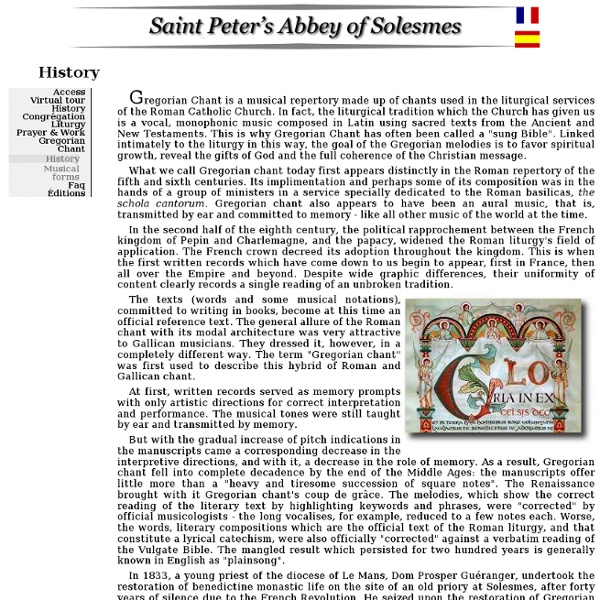The Influence of Gregorian Chant Through Today
Gregorian chant is a central tradition chant of Western Christianity that came into existence for that ritual services and mass celebrations. Gregorian chant originated in the West Germanic tribes, the areas of western and central Europe during 12th-13th century. Pope Gregory is believed to be the originator of Gregorian music. Gregorian chant, through its history, has survived many changes and reforms. Gregorian chants are the oldest known music to be adequately documented since 10th century. The chant of Gregorian music is learned by viva voce method.
Gregorian chant
Gregorian chant is the central tradition of Western plainchant, a form of monophonic, unaccompanied sacred song of the western Roman Catholic Church. Gregorian chant developed mainly in western and central Europe during the 9th and 10th centuries, with later additions and redactions. Although popular legend credits Pope St. Gregory the Great with inventing Gregorian chant, scholars believe that it arose from a later Carolingian synthesis of Roman chant and Gallican chant.
Gregorian Chant
Help support New Advent and get the full contents of this website as an instant download. Includes the Catholic Encyclopedia, Church Fathers, Summa, Bible and more — all for only $19.99... The name is often taken as synonymous with plain chant, comprising not only the Church music of the early Middle Ages, but also later compositions (elaborate melodies for the Ordinary of the Mass, sequences, etc.) written in a similar style down to the sixteenth century and even in modern times. In a stricter sense Gregorian chant means that Roman form of early plain chant as distinguished from the Ambrosian, Gallican, and Mozarabic chants, which were akin to it, but were gradually supplanted by it from the eighth to the eleventh century. Of the Gallican and Mozarabic chants only a few remains are extant, but they were probably closely related to the Ambrosian chant. The principal proofs for a Gregorian tradition may be summarized thus:
What is Gregorian Chant - GIA Publications
Before reviewing the main Gregorian chant books and resources, perhaps it is good to state what Gregorian chant is. Gregorian chant is the church’s own music, born in the church’s liturgy. Its texts are almost entirely scriptural, coming for the most part from the Psalter.
Gregorian Chants
Rome was in chaos. The once great nation was being plundered from the north by the Lombards, and its crumbling capital city was overshadowed by the brilliance of Constantinople from the east. The people of Rome sorely needed help and needed hope, and there was one man that they looked to for both.
Why is chant called Gregorian?
That "Gregorian" chant was named for and credited to Pope Gregory I (r. 590-604) is an accident of politics and spin doctoring. Tension between the Pope (the Bishop of Rome) and other Bishops regarding the authority of the Pope as "first among equals" was matched by tension between the Pope, as spiritual ruler of Rome, and Rome's secular rulers. This tension was an off and on thing until as late as the 15th century, when the "Conciliar Conflict" (c. 1409-1460) pitted the power of the Council of Bishops against the power of the Pope and Cardinals.
Medieval Music
Michael Delahoyde Washington State University The Church of Rome chants took shape in the 7th and 8th centuries; they have an Eastern flavor because of dependence on the Byzantine Empire. These chants can include an "ison": a note sustained by the lowest voices to emphasize modal changes -- so there's a semi-polyphonic tradition in Rome from early on. The term "Gregorian" is derived from Pope Gregory I (the Great) (c. 540-604), but this pope actually reprimanded deacons for singing the liturgy -- he felt they were better off preaching and caring for souls than winning praise for their voices. The papacy eventually considered it necessary to unify the liturgy. Under Pope Vitalian (657-672), the liturgy underwent renewal; chants had become overloaded with passing notes which blurred the melodic line.
How does Gregorian Chant differ from modren music?
Q&A From the January AD 2006 Our Lady of the Rosary Parish Bulletin Question: What is the difference between Gregorian Chant and other forms of Church and secular music? Answer: The idea of chanting the Scriptures and other religious songs is not unique to Christianity.



